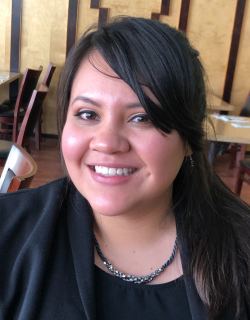

Photo credit: Daniel Abriel

Amina Stoddart, PhD, P.Eng.
Assistant Professor, Civil and Resource Engineering, Dalhousie University
Carolina Ontiveros
Research Associate, Dalhousie University
To the casual observer, the overlap between the water and wastewater industry and the healthcare field may not seem obvious. But in early April 2020, as COVID-19 continued to spread and Nova Scotia Health Authority (NSHA) needed to ensure safe, effective options for reprocessing N95 respirators in the event of a future shortage, the organization reached out to Dalhousie University. They were looking for researchers with knowledge of UV disinfection strategies to investigate the potential of disinfecting N95s and making them reusable.
Dalhousie engineering Professor Amina Stoddart and Research Associate Carolina Ontiveros, a recent engineering graduate, saw an immediate connection to their research on the use of UV disinfectant in the water and wastewater industry.
“Disinfection with UV light is very common in the water and wastewater industry,” explains Stoddart. “So it was a great fit in that we have that knowledge and could apply it to a different space.
“It’s obviously different for us to be disinfecting masks, but the premises are the same and the knowledge can be easily applied to this field as well.”
Since early April when the university was first approached and put together the project, the research team has been collaborating with NSHA to investigate the use of UV light.
“It’s very important that engineers are doing this in collaboration with healthcare professionals to bring both perspectives,” Ontiveros, whose masters thesis focused on UV/LED technology in water and wastewater, explains. “We have the scientific vigour, the quality control, the ability to apply the science in a tangible way, and they have the healthcare experience.”
Likewise, Stoddart explains that it’s the water and wastewater professionals who have the resources and the labs to accurately dose and test the UV light in a controlled experimental manner. And so far, they’ve had encouraging results.
“What we have found is that UV disinfection seems to be very effective,” Stoddart says. “If you go for a harsher disinfectant, you may actually hurt the integrity of the mask. But we’ve seen great disinfection with UV, which is very exciting.”
The hope is that by finding a safe, easy, and effective way to disinfect the single-use N-95 respirators, they can become reusable and thereby alleviate concerns about shortages in equipment for frontline personnel.
Stoddart adds that a byproduct of this work is realizing the different spaces in which her and her team’s engineering skillset can be applied.
“Engineers are trained to be problem-solvers and trained to think about applying the skills that they have to whatever situation arises. Engineers by nature want to fix things, want to make things work. I’ve seen this with our team – everyone is quite relentless in figuring things out and making this work and figuring out how we can help.
“We’ve never worked in healthcare. We’re water and wastewater professionals, but we have this unique knowledge and we see a problem that we can work through. It’s unfortunate that [the pandemic] is happening, but it’s given us the opportunity to see how our knowledge can help other sectors.”

